仁爱版英语七年级上册 谚语公开课定语从句 课件(共67张PPT)
文档属性
| 名称 | 仁爱版英语七年级上册 谚语公开课定语从句 课件(共67张PPT) |

|
|
| 格式 | ppt | ||
| 文件大小 | 4.3MB | ||
| 资源类型 | 教案 | ||
| 版本资源 | 仁爱科普版 | ||
| 科目 | 英语 | ||
| 更新时间 | 2023-08-11 09:14:46 | ||
图片预览

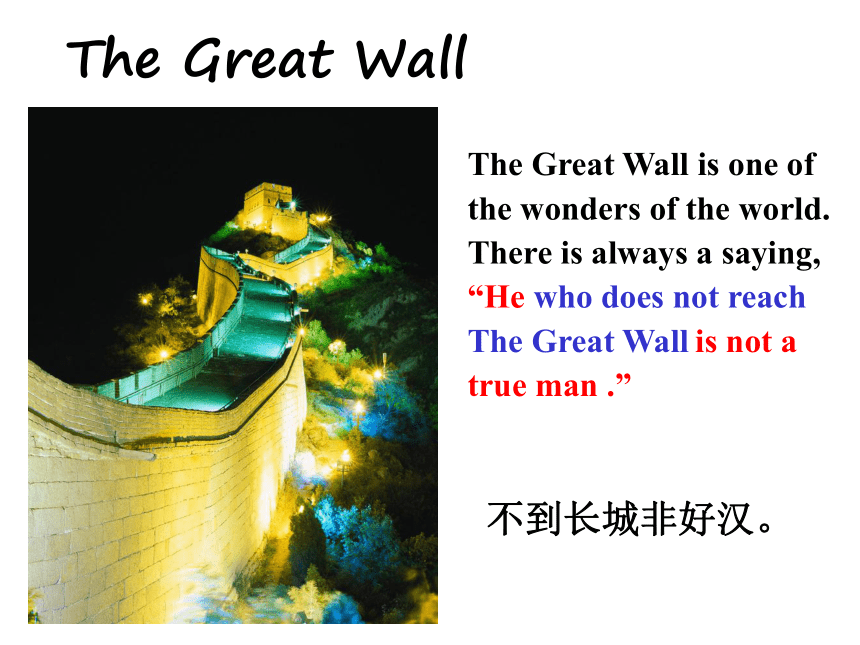
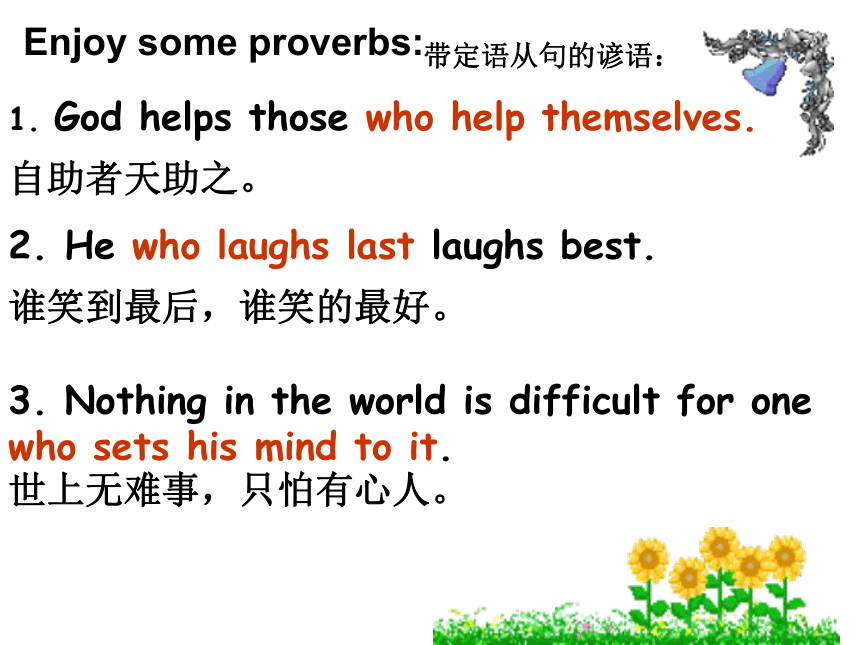
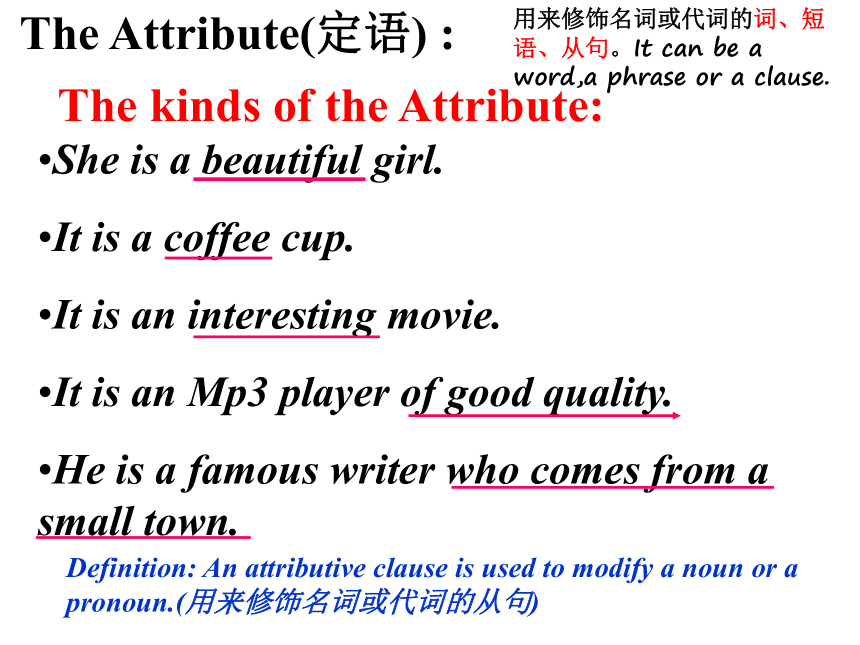
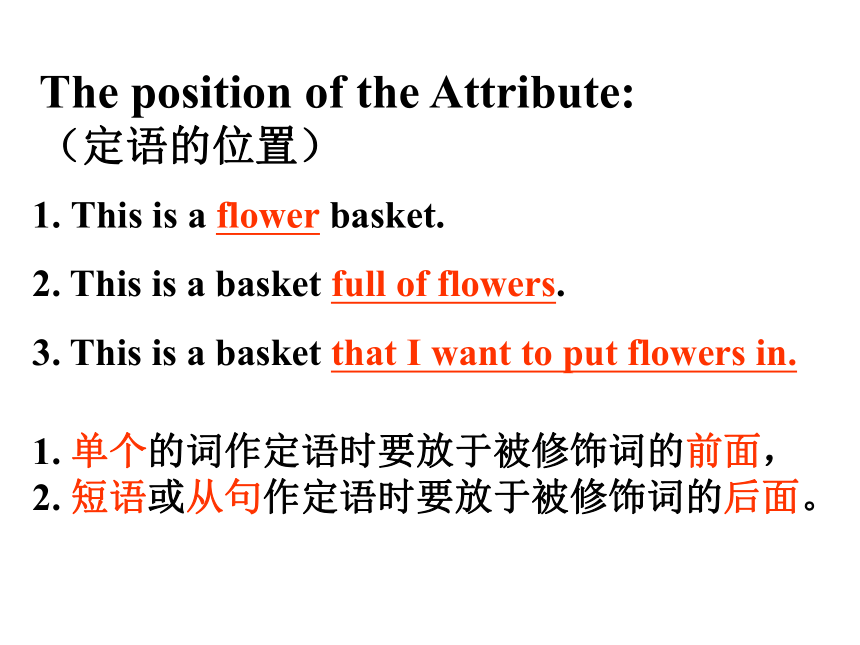
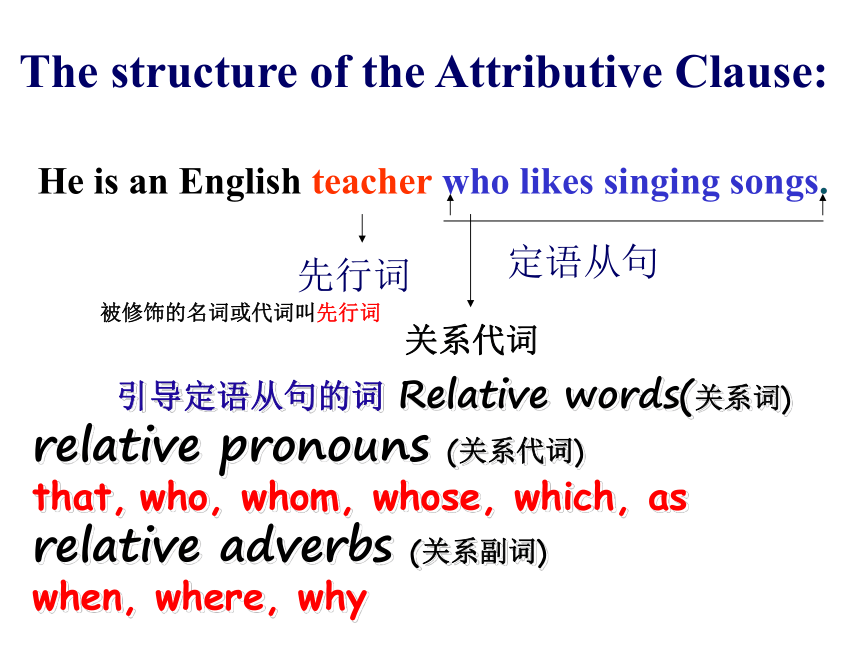
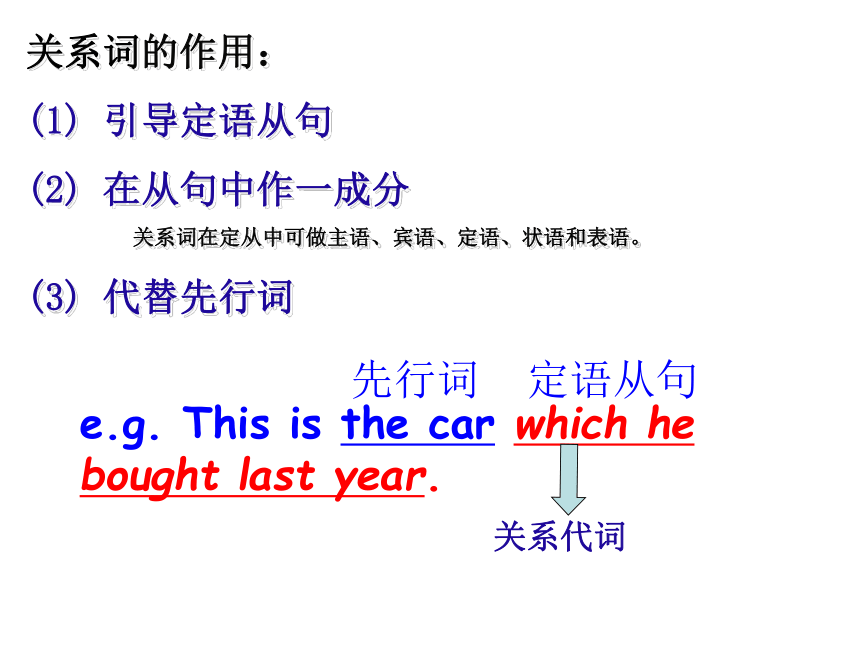
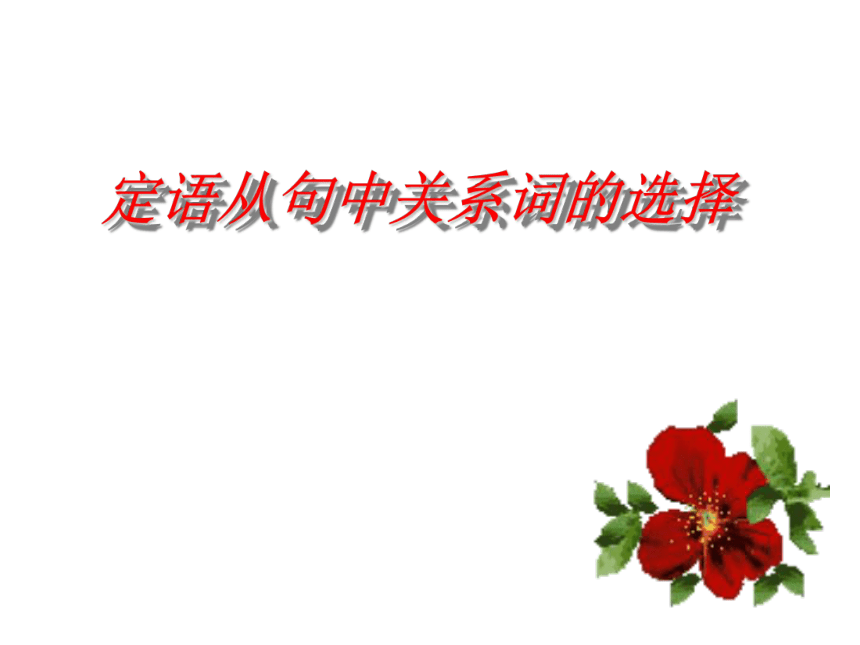
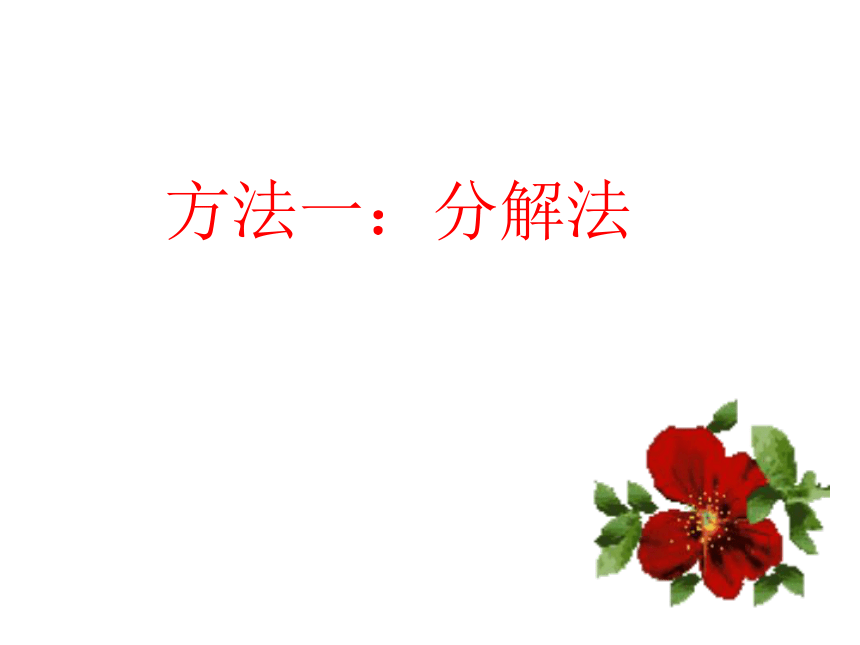
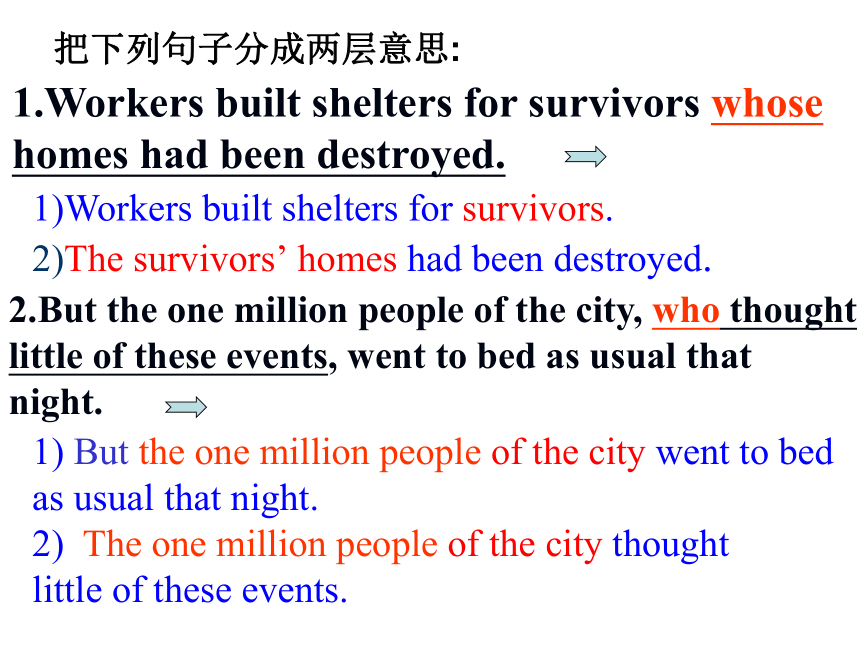

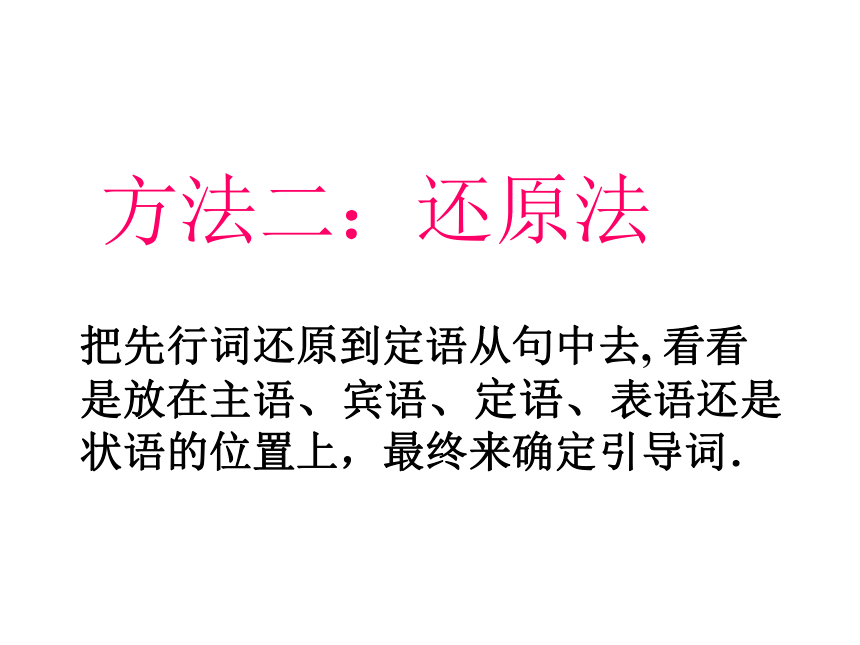
文档简介
(共67张PPT)
The Great Wall
The Great Wall is one of the wonders of the world. There is always a saying, “He who does not reach The Great Wall is not a true man .”
不到长城非好汉。
带定语从句的谚语:
1. God helps those who help themselves.
自助者天助之。
2. He who laughs last laughs best.
谁笑到最后,谁笑的最好。
3. Nothing in the world is difficult for one who sets his mind to it.
世上无难事,只怕有心人。
Enjoy some proverbs:
She is a beautiful girl.
It is a coffee cup.
It is an interesting movie.
It is an Mp3 player of good quality.
He is a famous writer who comes from a small town.
The Attribute(定语) :
The kinds of the Attribute:
用来修饰名词或代词的词、短语、从句。It can be a word,a phrase or a clause.
Definition: An attributive clause is used to modify a noun or a pronoun.(用来修饰名词或代词的从句)
The position of the Attribute: (定语的位置)
1. This is a flower basket.
2. This is a basket full of flowers.
3. This is a basket that I want to put flowers in.
1. 单个的词作定语时要放于被修饰词的前面, 2. 短语或从句作定语时要放于被修饰词的后面。
He is an English teacher who likes singing songs.
定语从句
先行词
The structure of the Attributive Clause:
关系代词
引导定语从句的词 Relative words(关系词)
relative pronouns (关系代词)
that, who, whom, whose, which, as
relative adverbs (关系副词)
when, where, why
被修饰的名词或代词叫先行词
e.g. This is the car which he bought last year.
先行词
定语从句
关系词的作用:
(1) 引导定语从句
(2) 在从句中作一成分
关系词在定从中可做主语、宾语、定语、状语和表语。
(3) 代替先行词
关系代词
定语从句中关系词的选择
方法一:分解法
把下列句子分成两层意思:
1.Workers built shelters for survivors whose
homes had been destroyed.
1)Workers built shelters for survivors.
2)The survivors’ homes had been destroyed.
2.But the one million people of the city, who thought
little of these events, went to bed as usual that
night.
1) But the one million people of the city went to bed as usual that night. 2) The one million people of the city thought
little of these events.
3. It was heard in Beijing, which is one
hundred kilometres away.
1) It was heard in Beijing.
2) Beijing is one hundred kilometres away.
4. A huge crack that was eight kilometres long
and thirty metres wide cut across houses,
roads and canals.
1) A huge crack cut across houses, roads and canals.
2) A huge crack was eight kilometres long and thirty metres wide.
方法二:还原法
把先行词还原到定语从句中去, 看看是放在主语、宾语、定语、表语还是状语的位置上,最终来确定引导词.
例一: The students ________ don’t study hard will not pass the exam.
____________ don’t study hard.
The students
主语,而且指人
who,that
例二: The woman _____________ you saw in the park is our Chinese teacher.
you saw ____________ in the park.
the woman
宾语,而且指人
whom, that, who,/
注意:如果先行词还原到定语从句中,充当的是宾语,那么可以把引导词省略.
例 1. The man __________ gave you the talk yesterday is our teacher.
that,who
指人: that/who (主语)
The usage of the relative pronouns
which , who, whom, that, whose
例2: The boy_________________ the nurse is looking after is my friend.
whom, that, who,/
指人: who/whom/that(宾语,可省略)
例3: The car________________ is red was damaged yesterday.
that,which
指物: that/which (主语)
The apple is mine.
The apple is mine.
The apple is yours.
The apple is small.
The apple is big.
which is small
which is big
which is red
which is green
Go Go
Tony
例4: The question_______________ I don’t understand is about grammar.
that,which,/
指物: that/which (宾语,可省略).
Do you know the man name is Wang Yu
Mary lives in the house door is red.
whose
whose
例5
whose + n = the + n + of which/whom
= of which/whom+ the + n.
whose在从句中只作定语,指人或物,“……的” ,若指物,可与of which+ the + n.互换,指人时用of whom+ the + n.互换
They live in a house,
whose door opens to the south.
They lived in a house, of which the door opens to the south.
They lived in a house, the door of which opens to the south.
Which house is mine
房顶是棕色的房子是我的。
The house is mine.
whose roof is brown
my house
The house is mine.
the roof of which is brown
The book ______ cover is red is an English grammar book.
The book the cover _______ is red is an English grammar book.
whose
of which
There are some people whose faces
you can’t forget.
=There are some people of whom the faces you can’t forget.
Summary: The usage of the relative pronouns(关系代词)
Talking about people
Do you know the man who ,that came to see Xiao Yang this morning
Talking about things
I couldn’t find the book which , that was bought yesterday.
whose
Do you know the boy whose parents are on holiday
He is a man who , whom, that, / we should all learn from.
The table which, that , / you just saw is made of plastics.
I’ve never been to the room whose windows are broken.
the ship/was the most beautiful in the world at that time
Titanic is the ship
which /that was the most beautiful in the word at that time.
__________
Rose and Jack are the lovers ________.
the lovers / met on the ship
who /that met on the ship
Rose
Jack
______
The man _________________ is Liu Xiang.
who ran fastest
Liu Xiang is the man ________________.
who ran fastest
a boy,
has a scar on his cheek
Harry Porter is a boy ____________ _____________________.
who/that has a scar on his cheek
Guangzhou is a city ___________________ _____.
Guangzhou
a city
develop fast
which /that develops fast.
Are you clear now
OK . Let’s do some exercise!
Fill in the blanks with relative pronouns:
that, which, who, whom and whose.
1.The man _________came to our school is Mr. Wang. 2.The girl _______________ I met is Lucy. 3.A child _______parents are dead is called Tom. 4.I like the book ____________you bought yesterday. 5. We shall never forget the days ___________we spent together. 6. I have a room ________window faces south.
who, that
whom, that, who,/
whose
that,which,/
that, which, /
whose
我劝他帮助那个父母是医生的女孩。
我劝他帮助那个女孩 + 她的父母是医生
I persuade him to help that girl.
Her parents are doctors
I persuade him to help the girl whose parents are doctors.
Translation
我买了一辆轮子是木头做的自行车
我买了一辆自行车 + 它的轮子是木头做的
I bought a bike
Its wheels were made of wood.
whose wheels
I bought a bike the wheels of which were made of wood.
of which the wheels
1. 这就是那位帮助我的人。
2. 你昨天见到的史密斯夫人是我的一个朋友。
3. 你认识一个叫王雨的人吗?
4. 我收到的那份礼物是我哥送的。
Turn the following sentences into English:
1. 这就是那位帮助我的人。
2. 你昨天见到的史密斯夫人是我的一个朋友。
3. 你认识一个叫王雨的人吗?
4.我收到的那份礼物是我哥送的。
This is the man who helped me.
Mrs. Smith whom you met yesterday is a friend of mine.
Do you know the man whose name is Wang Yu
Turn the following sentences into English:
The present that / which I received was from my brother.
Underline the attributive clauses:
Don’t forget the things that once you owned. Treasure the things that you can’t get. Don't give up the things that belong to you and keep those lost things in memory.
曾经拥有的,不要忘记。不能得到的,
更要珍惜。属于自己的,不要放弃。
已经失去的,留作回忆。
Have fun!
昨天来了个老外,进到办公室,前台小姐左看右看,大家都在打游戏,只有自己比较清闲,面带微笑的: 前台小姐:“Hello.” 老外:“Hi.” 前台小姐:“You have what thing?” 老外:“Can you speak English?” 前台小姐:“If I not speak English, I am speaking what?” 老外:“Can anybody else speak English?” 前台小姐:“You yourself look. All people are playing, no people have time, you can wait, you wait, you not wait, you go!” 老外:“Good heavens. Anybody here can speak English?” 前台小姐:“Shout what shout, quiet a little, you on earth have what thing?” 老外:“I want to speak to your head.” 前台小姐:“Head not zai. You tomorrow come. ”
Chinglish
中式英语
Do more exercises about the Attributive Clause.
1.你在会上看到的那个女孩是个出名的游泳运动员。
2.他就是我们昨天在报纸上见到照片的那个工人。
3.这是一家出售个人电脑的商店。
4.昨天我看的那部电影非常令人感动。
5.我从图书馆借的书非常有趣。
Turn the following sentences into English:
Practice makes perfect!
May you succeed in your studies!
1.你在会上看到的那个女孩是个出名的游泳运动员。
The girl(who, whom, that) you saw at
the meeting is a well-known swimmer.
2.他就是我们昨天在报纸上见到照片的那个工人。
He is the very worker whose picture
we saw in the newspaper yesterday.
3.这是一家出售个人电脑的商店.
This is a shop which/that sells personal computers.
4.昨天我看的那部电影非常令人感动。
The movie ( which/ that) I saw is very moving.
5.我从图书馆借的书非常有趣。
The book ( which /that) I borrowed from the library is very interesting.
The Great Wall
The Great Wall is one of the wonders of the world. There is always a saying, “He who does not reach The Great Wall is not a true man .”
不到长城非好汉。
带定语从句的谚语:
1. God helps those who help themselves.
自助者天助之。
2. He who laughs last laughs best.
谁笑到最后,谁笑的最好。
3. Nothing in the world is difficult for one who sets his mind to it.
世上无难事,只怕有心人。
Enjoy some proverbs:
She is a beautiful girl.
It is a coffee cup.
It is an interesting movie.
It is an Mp3 player of good quality.
He is a famous writer who comes from a small town.
The Attribute(定语) :
The kinds of the Attribute:
用来修饰名词或代词的词、短语、从句。It can be a word,a phrase or a clause.
Definition: An attributive clause is used to modify a noun or a pronoun.(用来修饰名词或代词的从句)
The position of the Attribute: (定语的位置)
1. This is a flower basket.
2. This is a basket full of flowers.
3. This is a basket that I want to put flowers in.
1. 单个的词作定语时要放于被修饰词的前面, 2. 短语或从句作定语时要放于被修饰词的后面。
He is an English teacher who likes singing songs.
定语从句
先行词
The structure of the Attributive Clause:
关系代词
引导定语从句的词 Relative words(关系词)
relative pronouns (关系代词)
that, who, whom, whose, which, as
relative adverbs (关系副词)
when, where, why
被修饰的名词或代词叫先行词
e.g. This is the car which he bought last year.
先行词
定语从句
关系词的作用:
(1) 引导定语从句
(2) 在从句中作一成分
关系词在定从中可做主语、宾语、定语、状语和表语。
(3) 代替先行词
关系代词
定语从句中关系词的选择
方法一:分解法
把下列句子分成两层意思:
1.Workers built shelters for survivors whose
homes had been destroyed.
1)Workers built shelters for survivors.
2)The survivors’ homes had been destroyed.
2.But the one million people of the city, who thought
little of these events, went to bed as usual that
night.
1) But the one million people of the city went to bed as usual that night. 2) The one million people of the city thought
little of these events.
3. It was heard in Beijing, which is one
hundred kilometres away.
1) It was heard in Beijing.
2) Beijing is one hundred kilometres away.
4. A huge crack that was eight kilometres long
and thirty metres wide cut across houses,
roads and canals.
1) A huge crack cut across houses, roads and canals.
2) A huge crack was eight kilometres long and thirty metres wide.
方法二:还原法
把先行词还原到定语从句中去, 看看是放在主语、宾语、定语、表语还是状语的位置上,最终来确定引导词.
例一: The students ________ don’t study hard will not pass the exam.
____________ don’t study hard.
The students
主语,而且指人
who,that
例二: The woman _____________ you saw in the park is our Chinese teacher.
you saw ____________ in the park.
the woman
宾语,而且指人
whom, that, who,/
注意:如果先行词还原到定语从句中,充当的是宾语,那么可以把引导词省略.
例 1. The man __________ gave you the talk yesterday is our teacher.
that,who
指人: that/who (主语)
The usage of the relative pronouns
which , who, whom, that, whose
例2: The boy_________________ the nurse is looking after is my friend.
whom, that, who,/
指人: who/whom/that(宾语,可省略)
例3: The car________________ is red was damaged yesterday.
that,which
指物: that/which (主语)
The apple is mine.
The apple is mine.
The apple is yours.
The apple is small.
The apple is big.
which is small
which is big
which is red
which is green
Go Go
Tony
例4: The question_______________ I don’t understand is about grammar.
that,which,/
指物: that/which (宾语,可省略).
Do you know the man name is Wang Yu
Mary lives in the house door is red.
whose
whose
例5
whose + n = the + n + of which/whom
= of which/whom+ the + n.
whose在从句中只作定语,指人或物,“……的” ,若指物,可与of which+ the + n.互换,指人时用of whom+ the + n.互换
They live in a house,
whose door opens to the south.
They lived in a house, of which the door opens to the south.
They lived in a house, the door of which opens to the south.
Which house is mine
房顶是棕色的房子是我的。
The house is mine.
whose roof is brown
my house
The house is mine.
the roof of which is brown
The book ______ cover is red is an English grammar book.
The book the cover _______ is red is an English grammar book.
whose
of which
There are some people whose faces
you can’t forget.
=There are some people of whom the faces you can’t forget.
Summary: The usage of the relative pronouns(关系代词)
Talking about people
Do you know the man who ,that came to see Xiao Yang this morning
Talking about things
I couldn’t find the book which , that was bought yesterday.
whose
Do you know the boy whose parents are on holiday
He is a man who , whom, that, / we should all learn from.
The table which, that , / you just saw is made of plastics.
I’ve never been to the room whose windows are broken.
the ship/was the most beautiful in the world at that time
Titanic is the ship
which /that was the most beautiful in the word at that time.
__________
Rose and Jack are the lovers ________.
the lovers / met on the ship
who /that met on the ship
Rose
Jack
______
The man _________________ is Liu Xiang.
who ran fastest
Liu Xiang is the man ________________.
who ran fastest
a boy,
has a scar on his cheek
Harry Porter is a boy ____________ _____________________.
who/that has a scar on his cheek
Guangzhou is a city ___________________ _____.
Guangzhou
a city
develop fast
which /that develops fast.
Are you clear now
OK . Let’s do some exercise!
Fill in the blanks with relative pronouns:
that, which, who, whom and whose.
1.The man _________came to our school is Mr. Wang. 2.The girl _______________ I met is Lucy. 3.A child _______parents are dead is called Tom. 4.I like the book ____________you bought yesterday. 5. We shall never forget the days ___________we spent together. 6. I have a room ________window faces south.
who, that
whom, that, who,/
whose
that,which,/
that, which, /
whose
我劝他帮助那个父母是医生的女孩。
我劝他帮助那个女孩 + 她的父母是医生
I persuade him to help that girl.
Her parents are doctors
I persuade him to help the girl whose parents are doctors.
Translation
我买了一辆轮子是木头做的自行车
我买了一辆自行车 + 它的轮子是木头做的
I bought a bike
Its wheels were made of wood.
whose wheels
I bought a bike the wheels of which were made of wood.
of which the wheels
1. 这就是那位帮助我的人。
2. 你昨天见到的史密斯夫人是我的一个朋友。
3. 你认识一个叫王雨的人吗?
4. 我收到的那份礼物是我哥送的。
Turn the following sentences into English:
1. 这就是那位帮助我的人。
2. 你昨天见到的史密斯夫人是我的一个朋友。
3. 你认识一个叫王雨的人吗?
4.我收到的那份礼物是我哥送的。
This is the man who helped me.
Mrs. Smith whom you met yesterday is a friend of mine.
Do you know the man whose name is Wang Yu
Turn the following sentences into English:
The present that / which I received was from my brother.
Underline the attributive clauses:
Don’t forget the things that once you owned. Treasure the things that you can’t get. Don't give up the things that belong to you and keep those lost things in memory.
曾经拥有的,不要忘记。不能得到的,
更要珍惜。属于自己的,不要放弃。
已经失去的,留作回忆。
Have fun!
昨天来了个老外,进到办公室,前台小姐左看右看,大家都在打游戏,只有自己比较清闲,面带微笑的: 前台小姐:“Hello.” 老外:“Hi.” 前台小姐:“You have what thing?” 老外:“Can you speak English?” 前台小姐:“If I not speak English, I am speaking what?” 老外:“Can anybody else speak English?” 前台小姐:“You yourself look. All people are playing, no people have time, you can wait, you wait, you not wait, you go!” 老外:“Good heavens. Anybody here can speak English?” 前台小姐:“Shout what shout, quiet a little, you on earth have what thing?” 老外:“I want to speak to your head.” 前台小姐:“Head not zai. You tomorrow come. ”
Chinglish
中式英语
Do more exercises about the Attributive Clause.
1.你在会上看到的那个女孩是个出名的游泳运动员。
2.他就是我们昨天在报纸上见到照片的那个工人。
3.这是一家出售个人电脑的商店。
4.昨天我看的那部电影非常令人感动。
5.我从图书馆借的书非常有趣。
Turn the following sentences into English:
Practice makes perfect!
May you succeed in your studies!
1.你在会上看到的那个女孩是个出名的游泳运动员。
The girl(who, whom, that) you saw at
the meeting is a well-known swimmer.
2.他就是我们昨天在报纸上见到照片的那个工人。
He is the very worker whose picture
we saw in the newspaper yesterday.
3.这是一家出售个人电脑的商店.
This is a shop which/that sells personal computers.
4.昨天我看的那部电影非常令人感动。
The movie ( which/ that) I saw is very moving.
5.我从图书馆借的书非常有趣。
The book ( which /that) I borrowed from the library is very interesting.
同课章节目录
- Unit 1 Making new friends
- Topic 1 Welcome to China!
- Topic 2 Where are you from?
- Topic 3 How old are you?
- Unit 2 Looking different
- Topic 1 I have a small nose
- Topic 2 What does she look like?
- Topic 3 Whose jacket is this?
- Unit 3 Getting togethe
- Topic 1 Does he speak Chinese?
- Topic 2 What do your parents do?
- Topic 3 What would you like to drink?
- Unit 4 Having fun
- Topic 1 What can I do for you?
- Topic 2 Would you like to cook with us?
- Topic 3 What time is it now?
